Acne
At Illustra Dermatology, we take a comprehensive approach to acne treatments at our office in the Bay Area. While there are multiple over-the-counter and at-home remedies that promise results, these products are often not physician prescribed and in many instances, they only contain trace amounts of helpful ingredients. The good news is that if addressed early and properly, acne is treatable. Treating acne may involve the use of multiple products in combination to address the main causes of acne such as sebaceous (oil) gland hyperactivity, hormonal changes, comedone (whitehead/blackhead) formation, and inflammation.
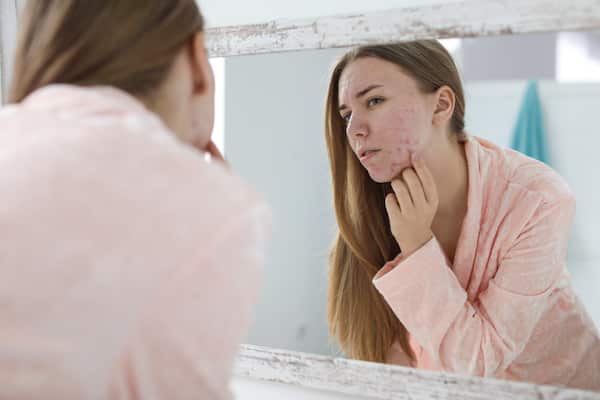
DIET AND SUPPLEMENTS
For select individuals, diet can play a role in acne development. Some studies show an association between high glycemic foods (carbohydrates), sugar, and dairy products. However, our acne treatment professionals in the Bay Area don’t recommend restrictive diets. In general, a balanced diet that includes fruits, vegetables, and whole grains is best for your health and may improve your acne. If you choose to reduce your dairy intake, skim milk is worse than whole milk for acne. We recommend avoiding supplements such as whey protein, vitamins B6/B12, iodine, and muscle-building supplements unless prescribed by a doctor.
TREATMENT OPTIONS
TOPICAL RETINOIDS
Topical retinoids are an important pillar in the treatment of acne vulgaris. These topical acne treatments we use for our Bay Area clients have a number of benefits, which range from helping to unclog the pores, all the way to helping to maintain younger, healthier skin cells at the top surface of the skin. Topical retinoids have anti-inflammatory properties and prevent the over-proliferation of acne. These products are notorious for causing irritation in the form of redness and peeling, but given time and careful application, most patients can avoid this. Even though the directions on the label may say to apply the medication every evening, in the very beginning, you should consider applying it only 2-3 nights/week for the first few weeks. By being careful for the first few weeks, you’re allowing your skin time to get used to the medication and generally the irritation will be minimal. After the first week or two, you can gradually add extra days of use per week, until eventually your skin can tolerate daily application. While we use these sometimes as single agents, they are best used in combination with benzoyl peroxide and clindamycin.
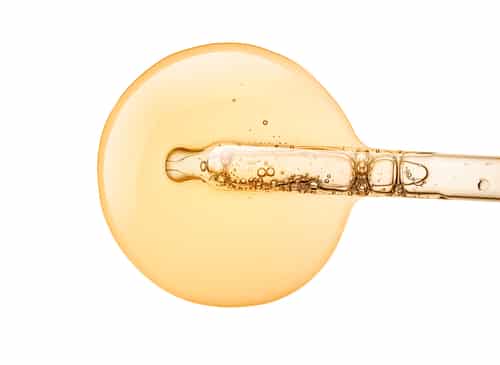
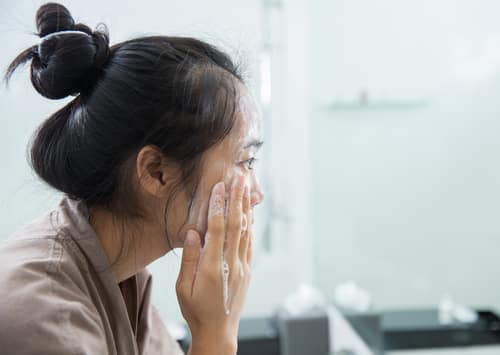
BENZOYL PEROXIDE (BPO)
BPO acts as an anti-inflammatory and unclogging agent that reduces the appearance of pores by decreasing pimples, inflammation, and redness caused by infected bumps under the skin. This impressive product is a high oxidizing agent that helps open up pores, directly targeting acne without involving the use of an antibiotic. It also has a drying effect which helps decrease excess sebum (also known as oil) on the skin that can ultimately decrease shine. While also having exfoliant properties, BPO improves the appearance of one’s skin texture. To prevent dryness and/or redness, it is recommended to start out with a lower percentage of BPO, and then increase the strength gradually over time when tolerated. It is also available by prescription in more concentrated forms and sometimes combined with other acne treatments.
AZELAIC ACID
Azelaic acid is a naturally occurring acid, a multi-benefit ingredient that has antimicrobial, anti-inflammatory, and antioxidant effects. Considered safe for all skin types, it is used as a topical treatment for a variety of treatments such as reducing pigmentation, reducing bacterial follicle growth, reducing inflammation, and treating pimples and pustules of mild to moderate acne and/or rosacea. It helps the skin to renew itself quickly, therefore, able to reduce pimple and blackhead formation. By reducing inflammation, decreasing brown patches and dark spots, and evening your skin tone, it can make your skin appear more youthful and overall healthier. It is safe to use during pregnancy and lactation. One month of using azelaic acid cream can show some improvement, while continuous use over 6 months can gradually show maximum results. Though it is available in prescription and over-the-counter gels/creams, speak to Dr. Browne in the Bay Area for her acne treatment recommendations of specific doses that fit accordingly to your case of symptoms.
TOPICAL ANTIBIOTICS
Clindamycin is a topical antibiotic that has been most frequently used for a variety of skin conditions, in particular, acne and rosacea. It is an active ingredient against both gram-positive and gram-negative bacteria. It offers direct activity against p-acnes by decreasing inflammation. It is widely available in combination with benzoyl peroxide as a solution, lotion, or gel.
Erythromycin is the second most commonly used topical antibiotic used for acne. Erythromycin has bacteriostatic effects and prevents the proliferation of bacteria. This means that this treatment suppresses the growth of the acne bacteria and decreases the inflammation caused by the bacteria. It is available as solution, gel, and ointment at 2% strength.
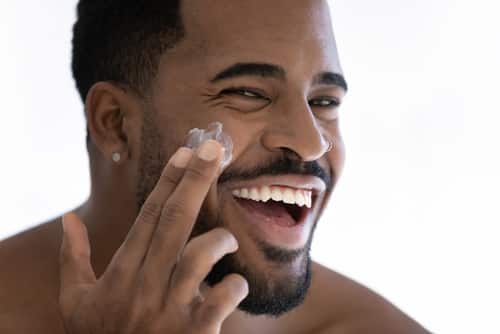
Minocycline is another form of a topical antibiotic that treats moderate to severe inflamed acne. This specific antibiotic prevents bacteria from making the proteins they need to grow, ultimately reducing redness and swelling. This medication is typically prescribed if inflamed acne has not been responding well to other antibiotics.
MISCELLANEOUS
Dapsone is a topical medication that possesses dual anti-inflammatory and anti-microbial properties to treat mild to moderate acne. It can be used alone or along with other topical or oral acne medications for a faster process. Dr. Browne, our Bay Area dermatologist, will let you know if this is the best acne treatment plan for you.
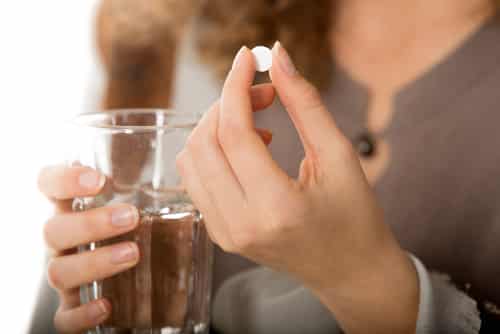
ORAL ANTIBIOTICS
There are many instances of moderate to severe acne where topical therapy is just not enough. In those instances, we may prescribe oral antibiotics such as oral tetracycline derivatives – particularly minocycline and doxycycline. These agents have a direct effect on Propionibacterium acne (p-acne), which is an important part of treating this type of inflammatory acne. It is likely that both mechanisms are important in treating acne vulgaris. While we are concerned about bacterial resistance, we are hopeful that the use of benzoyl peroxide and the anti-inflammatory uses of these drugs will prevent this from being a significant problem. Our goal is always to eventually taper off systemic and topical antibiotics. Topical retinoids are the best for long-term maintenance therapy.
ACCUTANE
In some cases, particularly those involving cystic acne or acne that has not responded to a number of treatments, Isotretinoin, also known as Accutane, is an important part of acne management. Accutane works by decreasing the size and output of oil glands, making the cells less able to form blackheads and whiteheads. Isotretinoin has known side effects that Dr. Browne will discuss at your office visit in the Bay Area. Most of the Accutane side effects are controllable and short-term which is why this class of drugs remains an important part of our treatment of severe acne. It would be important to view the I-pledge program online if you have more questions about the regulatory aspects of this drug.
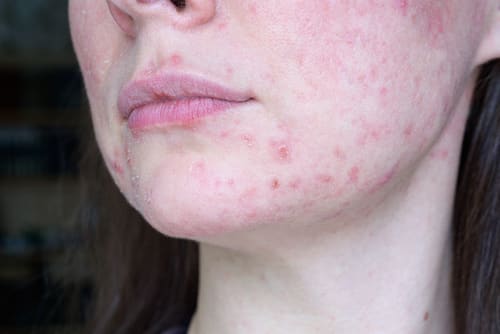

HORMONAL TREATMENTS
Spironolactone is used to treat an important patient subset of acne vulgaris in women with hormonal acne. This can be seen in women who are in their teens, 20s, 30s, 40s, and even 50s. It is often characterized by pink bumps, pustules, and nodules, particularly around the mouth and chin areas. There are often hormonal triggers for adult-onset acne. The drugs listed above are useful as topical agents. However, topical retinoids are often difficult to use around the mouth due to sensitivity and dryness of the area. Hormonal therapies, particularly birth control pills and spironolactone, do have a place in blocking the effect of hormones on sebaceous gland overactivity. If a female is not considering pregnancy spironolactone can be used.
Clascoterone is a newly approved topical medication similar to spironolactone. Like spironolactone clascoterone blocks the androgen hormones that contribute to inflammation and oil gland hyperactivity seen in hormonal acne. This medication is not an antibiotic. Unlike oral spironolactone, clascoterone can be used in men and does not have the same side effect profile. Clascoterone can be prescribed to treat moderate to severe acne as well as inflammatory and comedonal acne. The chronic nature of hormonal acne can be frustrating, but the above therapies can be helpful in the treatment.
CHEMICAL PEELS
A chemical peel is a skin-resurfacing procedure that uses a solution of various chemicals applied to the skin. At Illustra Dermatology we commonly use salicylic, Jessner solution, and the Perfect Derma Peel to treat acne. These peels penetrate the oil glands to unclog pores. Additional benefits include improvement of texture, hyperpigmentation, and fine lines. To protect your skin from irritation, talk to Dr. Browne and schedule a cosmetic consultation in our Bay Area office before a chemical peel. At the consultation, Dr. Browne will determine the best chemical peel for your skin type and discuss whether you should stop using certain types of products or medications -- including but not limited to topical retinoids, glycolic acid, or other medications. Individuals with a history of cold sores should take antiviral medications when they have chemical peels.
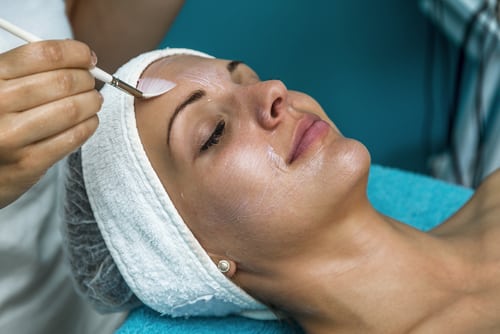
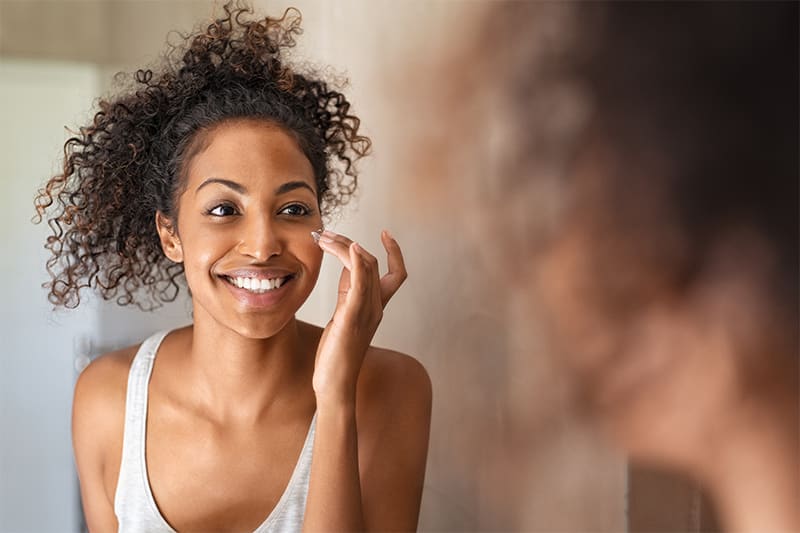
Why Choose Us for Acne Treatment
At Illustra Dermatology, we find the best methods for treating acne, with a combination of at-home care and in-office treatments. Especially during pregnancy, if you want to treat acne, it helps to get expert advice from Illustra Dermatology in the Bay Area before using any acne treatment. Seeing a board-certified dermatologist can mean the difference between clear beautiful skin and blemished skin. Our goal at Illustra Dermatology is to work one-on-one with patients until their skin clears and their confidence is restored. Having your acne properly diagnosed and treated here at Illustra Dermatology can help you maintain the health and beauty of your skin with individualized, long-term results.

